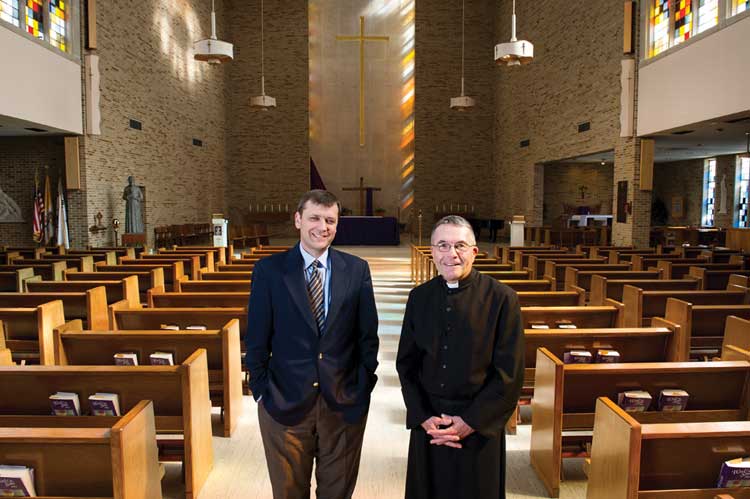Carmina Colorado was working at St. Adalbert School and Parish on the west side of South Bend as a bilingual secretary who could bridge the language gap between Spanish-speaking parents and the English-speaking administration. Parents approached her not only for translation but also for counsel on raising their families in this foreign language and culture.
The encounters prompted her to pursue a degree in psychology so she could better serve the population. She chose Holy Cross College (HCC) for its holistic approach to educating the mind, body and spirit through its curriculum. Along with classes, the degree work is based on four pillars: service learning, global perspectives, a discernment experience and a capstone presentation.
To fulfill the service learning requirement, Colorado continued to work at St. Adalbert. For the global perspectives experience, most students choose international opportunities in places such as Ghana, Peru, India or France. As a nontraditional student with a husband and family, she instead chose a domestic location, and she spent a weekend in Dearborn, Michigan, with an Arab-American community, learning about its beliefs, customs and culture, and destroying her own prejudices. Finally, Colorado completed her discernment experience, a professional internship at Samaritan Counseling Center, which she will draw on as she begins her master’s degree at Indiana University South Bend. Three vastly different experiences, but all contributing to the holistic education HCC provides.

Pulling it all together is the capstone presentation. All graduating seniors must compile a reflection of their diverse experiences, highlights of classes, service opportunities and personal events into a cohesive presentation that illustrates how they have grown, matured and studied in four years — a thesis on learning, perhaps.
For being born of the same mission of the Congregation of Holy Cross, the college run by its religious brothers offers a different approach to education than is provided at Notre Dame. With fewer than 500 students, Holy Cross College prides itself on personal attention and tailoring itself to fit a student’s needs.
“Different kids have different learning styles,” says Bobby Kloska ’90, vice president for mission advancement. “At Holy Cross, if you miss a couple of classes, people call you. Your professor or an administrator will call and say ‘Where have you been?’ There’s a level of personal connection and accountability that isn’t better or worse, it just suits different people.”
That personal attention is attractive to students, as are the NAIA sports, the service opportunities and the access to Notre Dame events and resources, such as ND’s marching band and choirs. Founded in 1966 as a place to educate religious brothers, HCC adapted to become a community college. Then, in 2005, it awarded its first set of bachelor degrees as a four-year residential college and now draws students from all over the country.
Though HCC is now awarding bachelor’s degrees, the college also intends to maintain its role of providing students the option of transferring into Notre Dame. In fact, this autumn it will reinvigorate its transfer relationship, which most recently has sent between five and 10 students each year to Notre Dame, to a more historically traditional number, says Don Bishop ’77, Notre Dame’s associate vice president for undergraduate enrollment. The formal Holy Cross-Notre Dame Gateway program will likely provide about 20 students the opportunity to attend Notre Dame after a first-year honors track program at HCC.
“There are some students with a strong aspiration to attend Notre Dame, who we believe may benefit first from being at Holy Cross College to build up specific strengths,” says Bishop. If those strengths are developed and recognized by ND’s Office of Admissions and the University transfer process, he says, “then we stand ready to bring them into Notre Dame to continue their educational experience.”
Holy Cross College is happy to help students progress in their education, says Brother John Paige, CSC, ’68, president of Holy Cross College, even if it means transferring.
“We take students as they are. If a student comes in and is transfer-intent then that’s fine, we’re going to give them whatever they need to be transfer-intent,” says Paige. “Others come and they want this experiential [education], and they want to go overseas and have immersions, they want to have a professional internship, they want to do service learning, they want that kind of a thing.” In the end, he says, HCC is a wonderful place to go to college and take advantage of either option.
It’s about serving students and families best, he says. Sometimes serving them best means working with Notre Dame and Saint Mary’s College to create a cohesive “tri-campus community.”
“If you take it from the point of view of the family and the siblings, we’re the youngest sibling. Now we’re giving our own degrees. But being the youngest sibling doesn’t mean we move to California and never talk again,” Paige says. “In fact, the youngest sibling looks to both Saint Mary’s and Notre Dame as partners in an educational institution where we each serve a very particular population. . . . We’re not in competition at all. In fact, the more we collaborate the better all three institutions are.”
Tara Hunt is an associate editor of this magazine.